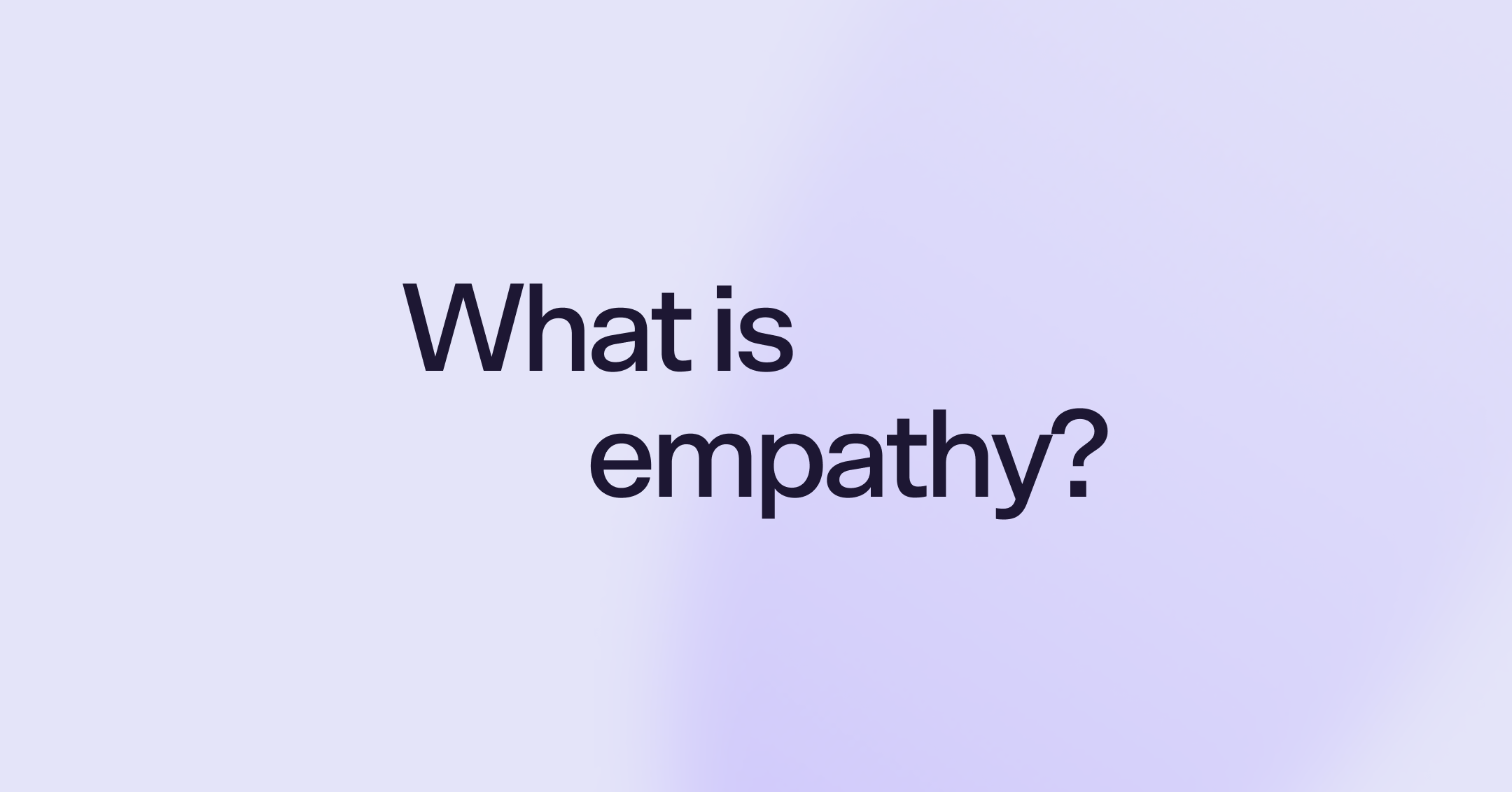Empathy is the ability to understand and share other people’s thoughts and feelings.
Research suggests that empathy starts to develop during the first few years of life and is influenced by both genetic and environmental factors.
Empathy is a skill that can always be developed or improved. Asking more questions, practicing mindfulness, and engaging in active listening are a few simple techniques to help people become more empathetic.
Empathy is the ability to understand, share, and care about other people’s emotions. By knowing how to feel with another person, you can connect with them in a real and meaningful way. Empathy is associated with increased self-awareness, emotional regulation, and open-mindedness. And it can improve how you communicate and bond with others.
If you’re unsure where you fall on the empathy scale, know that it’s a skill you can learn and cultivate over time. Conversely, if you find that empathy is negatively impacting your well-being, there are ways to learn how to practice the skill more effectively.
What it means to have empathy
Simply put, empathy is the ability to put yourself in someone else’s shoes. It allows you to understand another person’s thoughts, feelings, and experiences from their perspective.
Different ways to experience empathy include:
Emotional empathy: Also known as affective empathy, this is the ability to share and respond to another person’s emotions. For example, your friend tells you that they’re getting a divorce. As they tell their story, you share their heartbreak and feel their sadness and disappointment.
Cognitive empathy: This involves understanding how a person feels and what they might be thinking. Using the same example, you can imagine what it would be like to get a divorce and understand why your friend feels the way they do.
Empathetic people know how to genuinely listen, understand other points of view, and care about helping people feel better. While it may be more common to empathize with close friends versus strangers, empathetic people often want to help those in need.
You can experience empathy with friends, at work, and during day-to-day interactions. For example:
Your coworker receives negative feedback on an important project. She’s frustrated and disappointed and comes to you to vent. Instead of saying something like, “That’s a bummer, but at least you still have a job,” you make a point to listen carefully, without interrupting, and tell her you understand her distress.
Your partner comes home from work with a cough and sore throat. You’re supposed to meet your friends for dinner but can see that your partner is really struggling. Although they encourage you to keep your plans, you decide to stay home and make them some soup.
You’re driving home during rush hour, and someone cuts you off. Instead of responding with a rude gesture or your own aggressive driving, you wonder what that person might be going through to make them act that way. For example, are they late to meet their daughter for dinner or hurrying home after receiving bad news?
Empathy vs. sympathy
Empathy is sometimes used interchangeably with sympathy, but it’s important to note the differences. Empathy is when we feel with someone. We try to understand why someone feels the way they do and actively try to feel the pain with the other person.
Sympathy, on the other hand, is the act of feeling for someone, acknowledging someone else’s pain through compassion and support. This can often be seen as an understanding and recognition of the other person’s struggle.
The care you need, when you need it
Learn how Rula can support your mental health journey
Why some people are more empathetic than others
Empathy can develop as early as the first few years of life. Even before babies learn to speak, they begin to demonstrate emotional empathy when they mimic their caregivers’ facial expressions or learn to return a smile. So, if we’re born with the ability to be empathetic, why do some people seem more capable of empathy?
Research suggests that empathy can be influenced by genetic and environmental factors. Similar to other personality traits, there may be a genetic link to empathy — specifically with emotional empathy. Empathy also stems from a person’s values and upbringing. For example, you may have more empathy if you were raised in a home where family members showed affection and discussed their problems.
Conversely, burnout, stress, and growing up with abuse or discrimination may reduce empathy. Low levels of empathy can also be linked to mental health conditions like antisocial personality disorder, narcissistic personality disorder (NPD), and borderline personality disorder (BPD).
Empathy is a valuable skill, but having too much of it can be difficult at times. Although “empath” isn’t an official mental health diagnosis, the term is sometimes used to describe people who are highly sensitive to other people’s emotions. Empaths may struggle to set healthy boundaries or feel drained by intense emotions.
Building empathy with practice
Empathy involves curiosity, courage, and compassion — all which can be cultivated at any age. If you’re interested in increasing your empathy or learning to express it in more constructive ways, know that there are practical tips to help you develop the skill.
To start, try asking more questions, and avoid making assumptions. When speaking with other people, give them your full attention. This means not checking your phone or multitasking.
Other ideas for cultivating greater empathy include:
1. Being more curious
Empathy requires us to understand other people’s perspectives, so one way to cultivate greater empathy is to learn more about other people. For example, when your friend shares something that’s upsetting them, you can ask, “Have you experienced something similar before?”
You can also turn your curiosity to social media. By following people of different races, religions, and political persuasions, you may learn to understand more diverse points of view.
2. Practicing mindfulness and meditation
Empathy requires us to be present in the current moment, and research suggests that mindfulness meditation can help with that. One study of young adults who participated in mindfulness-based cognitive therapy (MBCT) found that it improved mindfulness, compassion, and empathy. Even just a few minutes per day may help you cultivate more empathy.
3. Considering how you communicate
There are plenty of ways to integrate more empathy into your daily communication. For example, when someone is sharing a concern, you can respond by saying, “We’ll get through this,” instead of, “You’ll get through this.”
The next time a friend comes to you with a problem, consider the following active-listening skills to guide your conversation.
Start with a few questions, like, “It seems like you have a lot on your mind. Want to talk about it?” or, “What’s life been like for you lately?”
From there, you can reflect on their perspective with statements like, “What I’m hearing you say is… ” or, “Tell me more about…”
Finally, validate their feelings and experience through words like, “Thank you for telling me. I imagine that must be… ” or, “I’d feel the same way if I were in your situation.”
4. Thinking about your ‘empathy blocks’
There’s a theory that people have empathy blocks, meaning aspects of life where it’s more difficult to exhibit empathy. For example, maybe you struggle to empathize with someone who isn’t very nice to you or has a negative outlook on life.
In some cases, your own mental or emotional state can prevent you from exhibiting empathy. When you’re feeling frustrated or overwhelmed, you may be less inclined to empathize with others.
5. Consulting a professional
If you’re still struggling to build or express empathy, consider working with a mental health professional. Therapy can help people improve self-awareness, emotional regulation, and communication skills — all of which can contribute to greater empathy.
If you’re an empath, remind yourself that you can care about someone without carrying their emotions as your own. Setting gentle boundaries — like taking breaks, grounding yourself, or offering support without overextending — can help you stay empathetic while protecting your own energy.

Ashley Ayala, LMFT
Clinical reviewer
Find care with Rula
Empathy allows people to understand and connect with others in meaningful ways. While this may come naturally for some people, others may require a little support with developing this skill. That’s where therapy can help.
At Rula, we’re committed to delivering a comprehensive behavioral health experience that helps people feel seen and understood so they can get back to feeling their best.
Rula makes it easier to find a licensed therapist or psychiatric provider who accepts your insurance so you don’t have to choose between affordable care and excellent care. With a diverse network of more than 15,000 providers, 24/7 crisis support, and appointments available as soon as tomorrow, we’re here to help you make progress — wherever you are on your mental health journey.
Rula's editorial process
Rula's editorial team is on a mission to make science-backed mental health insights accessible and practical for every person seeking to better understand or improve mental wellness.
Members of Rula’s clinical leadership team and other expert providers contribute to all published content, offering guidance on themes and insights based on their firsthand experience in the field. Every piece of content is thoroughly reviewed by a clinician before publishing.




